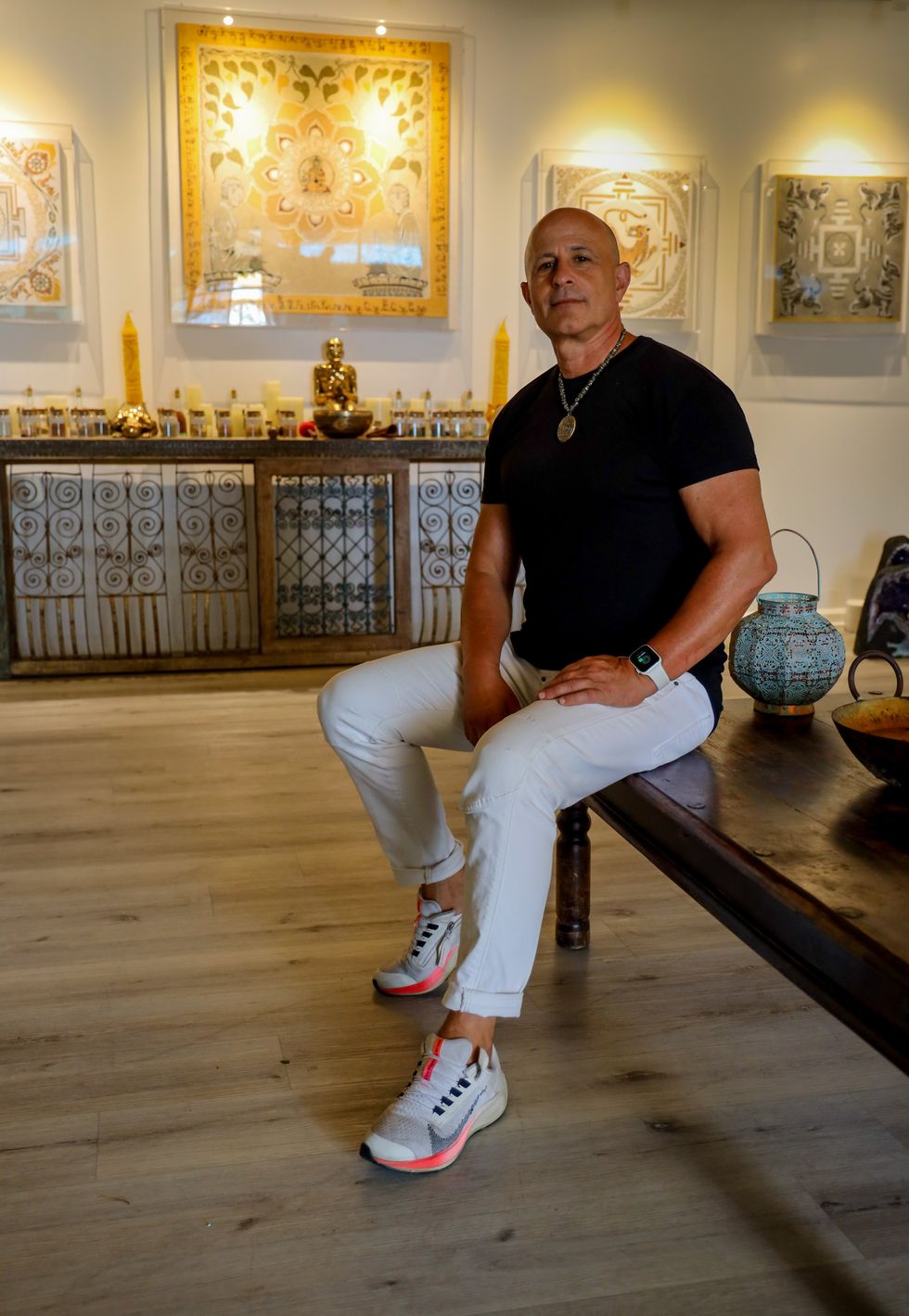Set in the foothills of Eastern Malibu across the street from Robert de Niro’s Nobu, the Rafi Lounge, a NFT-powered wellness center and coworking space, somehow looks like both a beachfront country club and a swank monastery. On a clear day, you can see Catalina Island across the ocean. The sign above the entrance says, “Welcome, please allow us to reintroduce you to yourself.”
Pushing through the braided rope entryway and passing a tranquil stone Buddha head waterfall, I arrived just after a yoga class former playboy model-turned “Dancing With the Stars” host Brooke Burke finished. The central open space that usually houses yoga mats or stationary bikes has been cleared off, and the giant projection screen behind the small stage is playing a tranquil plant video – an hour earlier, a larger-than-life Burke was on it helping clients “booty burn.”
The building – which used to belong to a venture capital firm – has been totally transformed to look like nature’s reclaimed it, dotted with lemon trees and cloaked in ornamental faux grass carpeting. Buddha statues are in every corner, some larger than five feet. On the way to one yoga room, there’s a small shop selling pricey essential oils, Rafi Lounge merch, and CBD gummies. On the wall of the shop hang three breathtakingly detailed portraits of indigenous peoples made by the founder with charcoal. There’s some construction ongoing, as they’re converting former corner offices into hot yoga saunas and a spa.
On the day of my visit, the place is bustling with staff who are lugging boxes of Himalayan salt panels to install in the hot yoga room. Israeli-born Kung-Fu master and former monk Rafi Anteby, the founder of the eponymously named space, tells me that after our chat he plans to paint them all black to match the walls. No detail is too small to notice, something evident in his Mandala work.

The Rafi Lounge opened last year on November 10—the day before crypto exchange FTX went bankrupt. “Everyone said Rafi, go into a shutdown, don’t do it,” Anteby said. “I said I can't, because I pre-sold to members and I promised them [the launch is] what will happen.”
Still, Anteby felt he couldn’t renege on his promise to open the lounge to those who did buy in, so he forged ahead. So, what do NFTs have to do with a wellness center?
Each, according to Anteby, corresponds to a level of access. The least expensive, Unity, is the lowest tier and gives holders access to virtual classes. The second tier, Mindful, encompasses physical and virtual access to the Lounge. And the highest tier selling for $5,500, Awakened, are the ones Rafi is selling individually that act as an all-access pass to the Lounge and its benefits and events (including, Anteby said, “spiritual yacht parties”). Both Mindful and Awakened NFTs are lifetime memberships to Rafi Lounge, and include free access to annual retreats it hosts.
But facing the changing seasons of the crypto market and unwilling to sacrifice his brand by letting the Rafi Lounge tokens be resold to oblivion on public markets, Anteby took the drastic step to control his NFT inventory – buying up the remainder a mere day after the minting.
Anteby admitted he “lost a quarter of a million dollars” between creating and buying the NFTs back. But he said it was worth it: “I'm going to take each because I want to control who's coming to my lounge. I want to know that they will be my advocates as well.”

Currently, there are 100 members, 55 of which are lifetime NFT holders. The 6,000 square-foot rooftop lounge is also open to the public. Which is to say, anyone can buy a 10-day pass for $250, pay the $40 fee for individual classes or come to public events. One of those people is Amie Yaniak who was diagnosed with stage four cancer last May that has since metastasized into her bones.
“I’ve never been anywhere like this. This was the first class I’ve done since the cancer, and it was just so cleansing,” Yaniak says. While she’s not a member, Yaniak told me she was interested in returning for more classes.
In addition to people like Yaniak, Anteby is also curating a more select crowd of well-to-do celebrities that can act as brand ambassadors for the lounge. He said he wants it to be a sort of more laid-back SoHo house, where top minds converge on the Pacific Ocean to make deals and network. Some of the names dropped during my tour of the property included Jamie Foxx (who Anteby calls a good friend), Chris Noth, Gladys Knight, and Equinox co-founder Lavinia Errico, whom I actually briefly met, since she’s a member of the Lounge’s advisory board.

As Tame Impala wafts from the lounge’s speakers, Anteby tells me stories of getting Taoist monks drunk at karaoke bars and studying medical qigong and tai chi in China. Anteby hung the intricate mandalas on the walls of a yoga room and he says they take around two years to complete as he carefully places individual grains of sand and uses tree sap to preserve their form. The mandalas are meant to be a contemplation of man’s relationship with nature, which is partly why Anteby designed the NFT versions of them to resemble a sort of elemental fusion that combines water, fire and earth.
Owning an NFT also corresponds to owning a fraction of the Malibu Mandala Rafi made that hangs in the lounge.

While Anteby admits the launch hasn’t netted him any profits yet and said he’s out around $1 million launching the place, he’s determined to turn the Rafi Lounge into a franchise and has plans to open future locations in other cities big into tech and wellness like Miami, Scottsdale, Ariz., Newport Beach, and Austin.
Besides the obvious cases like Yaniak’s, Anteby said he thinks the larger tech community needs a breather. “They all have digital burnout,” he said. “It's more than just me helping you to breathe. You need to take care of yourself, and here people do that all the time.”
- Weekly Tech Roundup: Despite Overall Crypto Downturn, Streetwear NFT Collabs Remain Popular ›
- The NFL Is Giving NFTs to Fans Attending Super Bowl LVI ›
- This LA Startup is Using NFTs to Create The Season Ticket Holder Experience for Restaurant Patrons ›
- The Tech Behind Universal's Super Nintendo World - dot.LA ›

